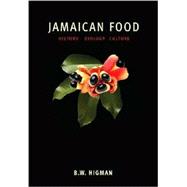
Note: Supplemental materials are not guaranteed with Rental or Used book purchases.
Purchase Benefits
What is included with this book?
| List of Illustrations | |
| Why Do Jamaicans Eat What They Eat? | p. 1 |
| Systems of Supply | p. 29 |
| Plants | |
| Roots | p. 55 |
| Stems, Leaves | p. 99 |
| Fruits | p. 131 |
| Seeds | p. 219 |
| Animals | |
| Molluscs, Crustaceans, Insects, Reptiles | p. 281 |
| Fish | p. 301 |
| Birds | p. 329 |
| Mammals | p. 351 |
| Inorganic Matter | |
| Salt, Earth, Water | p. 405 |
| Conclusion | p. 417 |
| Appendices | |
| Estimates of production, import and consumption of selected foods, 1822-2005 | p. 431 |
| Origins and dates of introduction of selected Jamaican food plants and animals | p. 433 |
| Notes | p. 441 |
| Bibliography | p. 511 |
| Index | p. 549 |
| Table of Contents provided by Blackwell. All Rights Reserved. |
The New copy of this book will include any supplemental materials advertised. Please check the title of the book to determine if it should include any access cards, study guides, lab manuals, CDs, etc.
The Used, Rental and eBook copies of this book are not guaranteed to include any supplemental materials. Typically, only the book itself is included. This is true even if the title states it includes any access cards, study guides, lab manuals, CDs, etc.